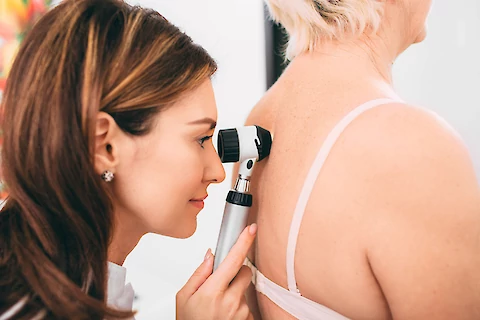
One crucial step in maintaining skin health is getting regular skin screenings. If you're a senior who has never had this procedure done before, it's natural to feel a bit nervous about the process. That's why Senior Helpers Chicago/Evanston put together this blog post to explain what happens during a skin cancer screening and help put your mind at ease.
What is a Skin Cancer Screening?
Skin cancer screenings are preventive measures to detect and diagnose any signs of skin cancer at an early stage. These screenings involve a thorough examination of the skin to identify any unusual growths or changes that may indicate skin cancer. There are a few different methods your dermatologist may use during your screening, including a visual inspection, dermoscopy, and potentially a biopsy if necessary.
Preparing For a Skin Screening
Before your screening, schedule an appointment with a local dermatologist or clinic. Various dermatology practices and medical centers offer screenings for skin cancer. Be sure to wear loose-fitting, comfortable clothing to your appointment, and avoid wearing makeup or nail polish to allow for clear visibility of all areas of your skin. It's also a good idea to discuss concerning spots or moles on your skin with your dermatologist.
During your skin screening, the dermatologist will begin by visually inspecting your skin. They will look for unusual moles, growths, or skin changes that could indicate a potential issue. One common method dermatologists use to assess moles is the "ABCDE" criteria, which stands for Asymmetry, Border irregularity, Color variation, Diameter, and Evolving. As the dermatologist examines your skin, mention specific concerns you have, as clear communication is critical to a thorough and accurate screening.
If the dermatologist notices anything unusual during the visual inspection, they may use a dermatoscope for a more in-depth look at the area. Dermoscopy involves using a specialized magnifying device with a light source to examine the skin's surface in greater detail. This non-invasive tool helps dermatologists identify abnormal structures that may not be visible to the naked eye.
After the Skin Screening
After the procedure, your dermatologist will discuss the results with you. If your results are normal and no concerning spots are found, they will likely recommend continuing with regular screenings and self-examinations to monitor any changes in your skin.
If abnormal results are found, your dermatologist may recommend further testing or treatments, depending on the severity and type of skin cancer. Remember, early detection is vital to successfully treating skin cancer, so it's essential to keep up with regular screenings and self-examinations.
Get Support and Encouragement From Senior Helpers
A skin cancer screening is vital for seniors to maintain skin health and detect potential issues early on. If you've never had a screening before, we hope this information has eased your nerves and encouraged you to schedule an appointment.
For those seniors living in the Chicago and Cook County area, Senior Helpers Chicago/Evanston offers support and care to help you maintain your overall health and well-being. Contact us for premium senior care services for yourself or your senior loved one!